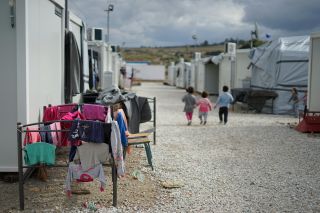Psychosis
Psychosis in Displaced Refugees
The prevalence of psychotic symptoms in migrants.
Posted June 13, 2024 Reviewed by Ray Parker
Key points
- War, being a common societal concern, can place individuals at risk for psychosis.
- Studies show that prevalence rates for refugees can be as much as twice as high as in nonrefugee populations.
- Cultural differences and a lack of awareness can lead to overlooking psychosis in refugee populations.

We have lived through wars throughout time. As horrifying as they are, they historically have been common and still are to some degree.
Refugee status is given to those who have fled their country of origin and cannot return due to the possibility of persecution. With Vietnam War refugees in my own family, I often wondered how mass immigration and displacement affected the likelihood of developing a psychotic disorder.
While poverty, abuse, and neglect are often discussed as being potential culprits of risk for developing psychotic disorders, the influx of displaced refugees cannot be ignored, especially considering that many countries are experiencing one of the biggest refugee crises in recent history due to wars in Ukraine, Sudan, Israel and Gaza, and elsewhere.
It would make sense to guess that displacement and migration due to war would destabilize a sense of self, making a person more prone to psychotic symptoms. The immense stress involved could very well incur a first episode of psychosis.
What are the real effects of war on refugees and their minds? A few studies point to some findings.
Real-World Findings
A study published earlier this year looked at 1.3 million people in Sweden to determine rates of psychosis in refugee and Swedish populations. The subjects were born between 1984 and 1997 in Asian, Oceanic, Sub-Saharan, Middle Eastern, and North African regions, as well as Western regions.
The researchers found that rates of psychotic disorders for migrants (including both refugees and non-refugees) were 1.47 to 2.07 times higher than for Swedes. The most affected were those in developing nations. Rates of psychosis were about twice as high in refugees compared to the Swede-majority population and almost 50 percent higher in non-refugee populations from the same region.
Another study published in 2023 conducted a systematic review of 23 studies of refugees in the United Kingdom who experienced forced displacement. Almost 1.3 million people were sampled and assessed for symptoms as well as disorders, including psychotic symptoms, schizophrenia, psychosis, mised psychotic disorders, and psychotic episodes.
The prevalence of psychosis included 28.4 percent of subjects experiencing psychotic symptoms in the sample, 1 percent experiencing psychosis, 2.9 percent experiencing psychotic episodes, and a 13.2 percent lifetime prevalence. Schizophrenia and mixed psychotic episodes had the lowest prevalence of 0.5 and 0.6 percent, respectively.
Prevalence of non-affective psychosis occurred in as little as 0.3 percent but occurred as high as 40.9 percent. Psychotic symptoms were more common than psychotic disorders, which indicates a higher risk for psychotic symptoms within other diagnoses.
Other studies point to asylum seekers having a higher risk of psychotic symptoms, especially those whose living situations are in constant uncertainty about where they will end up. These subjects were more likely to experience symptoms of psychosis while waiting on their refugee and asylum statuses.
Due to the severity and fringe status of psychotic symptoms, however, sometimes treatments for psychosis in refugee populations remain overlooked. A 2024 meta-analysis that analyzed the mental health of displaced new mothers found that psychotic perinatal symptoms were often overlooked in the study focus, even though those refugee mothers are more likely to have psychotic perinatal experiences.
Trauma and stress have long been associated with putting individuals at high risk for psychotic symptoms. Many conflicts arise when attempting to treat refugees and their symptoms. Different cultures might view their symptoms as normal or perhaps nonproblematic. Western psychotherapy could also impose highly self-led philosophies to treatment, which can contradict the socially relative qualities that make up the livelihoods of other cultures. Psychological and therapeutic interventions from the West might be harmful to those in other cultures, given the culture shock that occurs with displacement.
Despite cultural differences, interventions for the first episodes of psychosis, depression, post-traumatic stress disorder (PTSD), and anxiety have been shown to be effective in adolescents and adults. Given that psychotic-related experiences seem to be prevalent in refugee populations, screening for at-risk populations could prove beneficial.
References
Burr, L., Dykxhoorn, J., Hollander, A. C., Dalman, C., & Kirkbride, J. B. (2024). Refugee status and the incidence of affective psychotic disorders and non-psychotic bipolar disorder: A register-based cohort study of 1.3 m people in Sweden. Journal of Affective Disorders.
Smyth, E., Steel, C., & Ellett, L. (2023). The prevalence of non-affective psychosis in refugee populations: A systematic review. Schizophrenia Research, 260, 99-112.
Côté-Olijnyk, M., Perry, J. C., Paré, M. È., & Kronick, R. (2024). The mental health of migrants living in limbo: a mixed-methods systematic review with meta-analysis. Psychiatry Research, 115931.
Almeida, L. M., Moutinho, A. R., Siciliano, F., Leite, J., & Caldas, J. P. (2024). Maternal mental health in refugees and migrants: a comprehensive systematic review. Journal of International Migration and Integration, 25(1), 209-222.
Serra, R., Purgato, M., Tedeschi, F., Acartürk, C., Karyotaki, E., Uygun, E., ... & Barbui, C. (2024). Effect of trauma on asylum seekers and refugees receiving a WHO psychological intervention: a mediation model. European journal of psychotraumatology, 15(1), 2355828.




